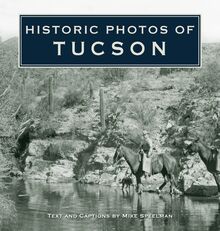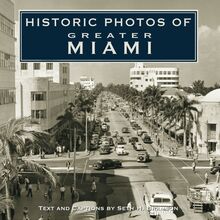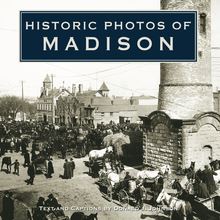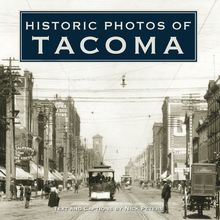Historic Photos of Tallahassee , livre ebook
189
pages
English
Ebooks
2007
Vous pourrez modifier la taille du texte de cet ouvrage
Obtenez un accès à la bibliothèque pour le consulter en ligne En savoir plus
Découvre YouScribe en t'inscrivant gratuitement
Découvre YouScribe en t'inscrivant gratuitement
189
pages
English
Ebooks
2007
Vous pourrez modifier la taille du texte de cet ouvrage
Obtenez un accès à la bibliothèque pour le consulter en ligne En savoir plus
Publié par
Date de parution
01 avril 2007
Nombre de lectures
2
EAN13
9781618586872
Langue
English
Poids de l'ouvrage
30 Mo
From the old capitol to the new capitol, the Battle of Natural Bridge to the battles at Doak Campbell Stadium, Historic Photos of Tallahassee is a photographic history collected from the area's top archives. With around 200 photographs, many of which have never been published, this beautiful coffee table book shows the historical growth from the mid-1800's to the late 1900's in stunning black and white photography. The book follows life, government, events and people important to Tallahassee and the building of this unique city.
Spanning over two centuries and two hundred photographs, this is a must-have for any long-time resident or history lover of Tallahassee!
Publié par
Date de parution
01 avril 2007
Nombre de lectures
2
EAN13
9781618586872
Langue
English
Poids de l'ouvrage
30 Mo
HISTORIC PHOTOS OF
TALLAHASSEE
T EXT AND C APTIONS BY A NDREW N. E DEL
The Gallie-Munro Opera House was the focal point for community social affairs before 1900. Originally built by Alexander Gallie in 1874, Robert Munro bought it and renovated it twelve years later. It housed road shows, choir concerts, dance recitals, and school graduations. It has been restored to its 1890 appearance.
HISTORIC PHOTOS OF
TALLAHASSEE
Turner Publishing Company
200 4th Avenue North Suite 950
Nashville, Tennessee 37219
(615) 255-2665
412 Broadway P.O. Box 3101
Paducah, Kentucky 42002-3101
(270) 443-0121
www.turnerpublishing.com
Historic Photos of Tallahassee
Copyright 2007 Turner Publishing Company
All rights reserved.
This book or any part thereof may not be reproduced or transmitted in any form or by any means, electronic or mechanical, including photocopying, recording, or by any information storage and retrieval system, without permission in writing from the publisher.
Library of Congress Control Number: 2006937076
ISBN-10: 1-59652-324-7
ISBN-13: 978-1-59652-324-1
Printed in the United States of America
07 08 09 10 11 12 13 14-0 9 8 7 6 5 4 3 2
C ONTENTS
A CKNOWLEDGMENTS
P REFACE
A C APITAL B EGINNING (1824-1900)
A C APITAL I DEA (1901-1920)
A C APITAL C ITY (1921-1940)
A C APITAL C OMPLEX (1941-1970)
N OTES ON THE P HOTOGRAPHS
Added in 1902, the cupola on the new capitol dome was the highest spot in Tallahassee and afforded great views of the area. This view, taken around 1914, shows the east side of Monroe Street and the Leon County Courthouse, with its tower.
A CKNOWLEDGMENTS
This volume, Historic Photos of Tallahassee , is the result of the cooperation and efforts of many individuals and organizations. It is with great thanks that we acknowledge in particular the valuable contribution of the State Archives of Florida, Erik Robinson, and N. Adam Watson, Photographic Archivist at the archives.
This project represents countless hours of review and research. The researchers and writer have reviewed thousands of photographs. We greatly appreciate the generous assistance of the archives listed here, without whom this project could not have been completed.
The goal in publishing this work is to provide broader access to a set of extraordinary photographs. The aim is to inspire, provide perspective, and evoke insight that might assist officials and citizens, who together are responsible for determining Tallahassee s future. In addition, the book seeks to preserve the past with respect and reverence.
With the exception of touching up imperfections caused by the vicissitudes of time and cropping where necessary, no other changes have been made. The focus and clarity of many images is limited to the technology of the day and the skill of the photographer who captured them.
We encourage readers to reflect as they explore Tallahassee, stroll along its streets, or wander its neighborhoods. It is the publisher s hope that in making use of this work, longtime residents will learn something new and that new residents will gain a perspective on where Tallahassee has been, so that each can contribute to its future.
- Todd Bottorff, Publisher
P REFACE
The photographic history of Tallahassee is well documented. At least four books of historic photographs have been published, thousands of images are available online at the State Archives, and many more have been included in other websites, articles, and videos. There are, however, compelling reasons for another book of historic photographs of Tallahassee. First, owing to the sheer number of extant photographs, even those familiar with the city s history will likely discover new images. Those unfamiliar with the city s past will reap a fresh glimpse into the rich photographic history of this community. Second, in addition to photographs, every book or portfolio offers its own commentary and perspective on the past. The focus of this volume is on Tallahassee s rich cultural heritage amid its lovely natural setting.
Individually, photographs offer an unspoiled glimpse of another place and time. Aided with informative text about specific elements, the viewer can draw his own insights and interpretation. As a collection, photographs constitute a history of a community s challenges, growth, and change. To help the viewer visually experience the historical continuity of Tallahassee, the images are arranged chronologically.
The materials used in developing the captions and overall perspective of the book are the product of many hours of research at the Florida State Library and Archives, Florida State University library, Supreme Court library, and Old Capitol collections.
Many in the general public have gained a cursory knowledge of Tallahassee in recent years. As the state capital of Florida, it is the setting for national news stories about the entire state. Every year thousands of people come to Tallahassee, some to attend the universities, others to work for the state government, and many as tourists to visit the state capital. For all those wishing to discover more about Tallahassee the goal of this work is to provide some insight and perspective about its traditions, history, people, and culture.
Summaries of each of the four eras provide historical background for the photographs. Section 1, A Capital Beginning, briefly describes the founding of the city, and spans the Civil War to the turn of the century. Section 2, A Capital Idea, covers the impact of education and government in the first two decades of the twentieth century. Section 3, A Capital City, traces the city s growth from a small rural town. Section 4, A Capital Complex, covers capital expansion from the beginning of World War II to the 1970s.
In each era the selection of photographs together with the captions and introduction provides a broad perspective on the development of Tallahassee. Various aspects are traced from period to period-the economy, civic improvements, education, state government, and social trends.
Tallahassee is situated in a garden spot of green hills, year-round flowers, and majestic oaks draped with Spanish moss. Walking around Tallahassee, one covers the same ground traversed by Apalachee Indians and Spanish conquistadors. Desoto, Osceola, Andrew Jackson, governors, presidents, slaves, and adventurers all walked the land. The origin of the Native American word tallahassee is generally translated old fields or abandoned villages. Perhaps ghost town is a more apt translation, for it evokes the romanticism of Tallahassee-a city with a strong sense of its past in a timeless natural setting.
It is hoped that this work will add to the understanding of the unique cultural heritage of Tallahassee.
This rare mola was caught off St. Marks, Florida, and brought to Tallahassee on the back of a truck. Only 20 miles from the little fishing village of St. Marks, Tallahassee is close to the Gulf of Mexico. Fishing and water sports have long been a favorite pastime.
A C APITAL B EGINNING
(1824-1900)
The Adams-Onis treaty, ratified in 1821, transferred East and West Florida from Spain to the United States. The territory of Florida was formed the next year retaining the two former capitals of St. Augustine and Pensacola. The Territorial Council selected the little Indian village of Tallahassee as the site for a new capitol in 1823. A lawless place, gunfights and duels were common in the new town; Ralph Waldo Emerson called it a grotesque place of land speculators and desperados. The year 1841 proved particularly disastrous with a yellow fever epidemic, major bank failure, and a terrible fire. Despite these setbacks, a state constitution was adopted and in 1845 Tallahassee became the capital of the 27th state of the Union. As the cotton economy continued to prosper, Tallahassee grew as the social and economic hub of the nearby slave-worked cotton plantations.
In 1861 Florida joined the Confederacy, proclaiming the Ordinance of Secession on the capitol steps. Four years later, the city declared that Tallahassee was the only Confederate capital east of the Mississippi River not captured during the Civil War. After the war, reconstruction brought economic and social challenges to Tallahassee as newly freed slaves or freemen required jobs, education, and basic subsistence. During this period attempts to return to the pre-war cotton economy failed owing to disease, a declining market, and lack of financing. Without an agricultural base, there was virtually no growth from 1865 to 1876. At the capitol, state politics went through a stormy period of appointed governors, carpetbaggers, and a newly empowered faction of freed slaves.
After the 1876 election, Democrats and old Southern political factions gradually gained control of state government, focusing on stimulating business and a return to pre-war social stability. As the economy grew, the former slave community, politically and socially, was suppressed.
Tallahassee s economy is still dependent on agriculture, but Leon County farmers diversified into other products including tobacco, nuts, pears, grapes, and sugar cane. The 1880s brought an economic recovery and up to the turn of the century the population grew at a rate of 20 percent. During that time, Tallahasseans struggled to become more metropolitan, adding many civic improvements-animal control laws, street-lamps, free mail delivery, sidewalks, an opera house, a luxurious residential district, a grand hotel, and even a streetcar line.
Although founded as the capital city of Florida, over a decade after the Civil War Tallahassee still looked like a frontier town, with few buildings and wide, rough dirt streets. Residents pose with a horse-drawn wagon in the middle of town on Monroe Street. The Phoenix building at right burned in 1877.
Ox carts pause on Park Avenue, prominent center of early Tallahassee. On the far left, the market place operated daily and was regul














